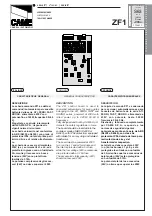
Dell 10Gb Ethernet Pass Through II
Rev 1.00
5
1
Overview
This manual explains the use of the embedded software management of the 10GbE PTM. It
explains how to connect to the 10GbE PTM and to the CMC, and how to update the module and
device firmware and software.
This manual covers the following topics:
• The rest of this section provides a high-level overview of the I/O Module structure and capabili-
ties
•
Section 2, “Connecting to the 10GbE PTM CLI,” on page 8
, explains how to connect to the
10GbE PTM and issue CLI commands
•
Section 3, “Command Line Interface (CLI) Reference,” on page 12
documents the CLI
•
Section 4, “Operating Procedures,” on page 19
describes the detailed sequence of operations
required to achieve tasks such as software update
1.1
Port Groups
The 10GbE PTM has 16 front panel ports divided into two groups: A and B. Group A consists of
ports 1 through 8, providing service to blades 1 through 8, respectively; Group B consists of ports
9 through 16, providing service to blades 9 through 16, respectively.
The supported link protocol for all ports is 10GigE XAUI (KX4)
Figure 1 shows the front panel ports and their partitioning into Group A and Group B.
Figure 1: Front Panel Link Speed Port Groups
1.2
Port Link State Reflection
The 10GbE PTM reflects the link state from the uplink to the downlink. When an uplink port con-
nected to a remote peer (e.g. an Ethernet switch) is disconnected, the respective server blade will
indicate link down event. When the uplink port is connected, the respective server blade will indi-
cate link up.
1.3
Link Protocol Mismatch Condition
A port may enter a link protocol mismatch condition. When in this condition, the port links (both
uplink and downlink) will remain inactive. Mismatch condition is indicated by the port LEDs.
Additional information about the mismatch condition is available via the CLI. Link protocol mis-
match would occur under the following conditions:
9
10
11
12
13
14
15
16
1
2
3
4
5
6
7
8
D
D
D
10 Gb Ethernet Pass Through II






































